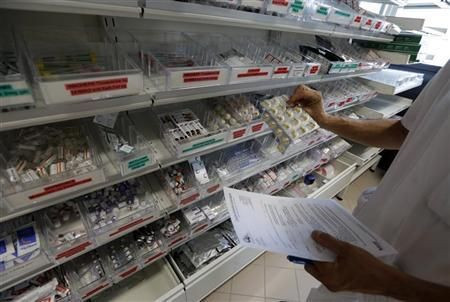US Drug Companies Take Merger Route To Avoid Taxes, Compensate For Patent Expirations, Respond To Falling Healthcare Spending

U.S. drug companies have a headache.
Pressed by expiring patents on Lipitor, Viagra and other recent wonder drugs that made companies like Pfizer Inc. (NYSE:PFE) billions of dollars and challenged by foreign competitors facing smaller tax bills, several large U.S. pharmaceutical companies are eyeing non-U.S. acquisitions. The search for foreign acquisitions also reflects the fact that global health care spending is falling as consumers and nations balk at out-of-control costs.
Amid those factors, Pfizer last month sweetened its bid for British rival AstraZeneca (LON:AZN) to 58.8 billion pounds ($98.9 billion) following earlier rejected offers for the company. Add to that the Novartis AG (VTX:NOVM) plan to swap assets with GlaxoSmithKline PLC (LON:GSK) and a recent buying spree by Canada’s Valeant Pharmaceuticals International Inc. (NYSE:VRX), and you have $175 billion of proposed deals, according to CMS Pharma CEO Andrew Bardot.
And U.S. drug maker Abbott Laboratories (NYSE:ABT) said Friday it’s buying Chile’s CFR Pharmaceuticals to double its Latin American branded generics business for just shy of $3 billion.
Speaking last month to TerrapinBriefings.com, Bardot said, “Pfizer is chasing the next big acquisition. Military tacticians would refer to it as 'carpet-bombing' as opposed to a 'precise strike.'"
He said the purchase would bolster Pfizer’s drug development pipeline and cut costs. He added that that the company would also “benefit from a tax inversion, and the cherry on the cake.”
Obviously Pfizer aims to cut costs in the current environment, and the Financial Times calculated last month that combined tax savings and synergies with AstraZeneca could be $38 billion.
The Pfizer deal epitomizes the high cost of such transactions these days, and that’s one caveat Bardot says may cool activity. “Valuations are too high, rendering many acquisitions unpalatable. Many will have to wait until the biotech bubble deflates,” Bardot said.
Valeant made news earlier this year when it teamed up with activist investor Bill Ackman to bid for Botox maker Allergan Inc. (NYSE:AGN). Their cash-and-stock offer, which includes a nearly $15 billion cash component, an SEC filing stated, values Allergan shares at $165 to $170 a share, according to reports. Ackman's Pershing Square, a New Jersey-based hedge fund with assets of about $13 billion, spent about $4 billion to acquire a 9.7 percent stake in the Irvine, California-based Allergan and believes the company is undervalued.
“There is a logical thread in terms of combining a product portfolio for both companies by focusing on strong brands (such as Botox) in markets where patients or doctors themselves are making the buying decision rather than cost-conscious health care payers,” Bardot told TerrapinBriefings.com.
He added that Valeant and Acman know how to cut costs. He said Valeant plans to cut research and development spending at Allergan to $200 million from $1.1 billion.
Novartis last month unveiled maybe the most interesting recent big pharma deal when it agreed to acquire GlaxoSmithKline's cancer-drug business for $14.5 billion and at the same time sell Glaxo most of its vaccine business for $7.1 billion plus royalties. The Swiss company also said it was selling its animal health division to Eli Lilly and Co. (NYSE:LLY) for nearly $5.4 billion.
Echoing the other dealmakers, Novartis CEO Joseph Jimenez said when he announced the deal, "(The transactions) improve our financial strength, and are expected to add to our growth rates and margins immediately."
The deal impressed Bardot, who was prompted last month to say of the company, “Novartis is the ballerina in the Bolshoi. An insightfully crafted series of transactions, each in itself worth of a Harvard case study as to how it addresses a weakness, a strength or just factor market realities. This would be the ultimate precision strike, taking home what you need and nothing more, minimizing collateral damage (i.e. transactional risks and any subsequent integration risks), limiting cash outflow, maximizing cash inflows. Masterful in every way."
© Copyright IBTimes 2024. All rights reserved.






















